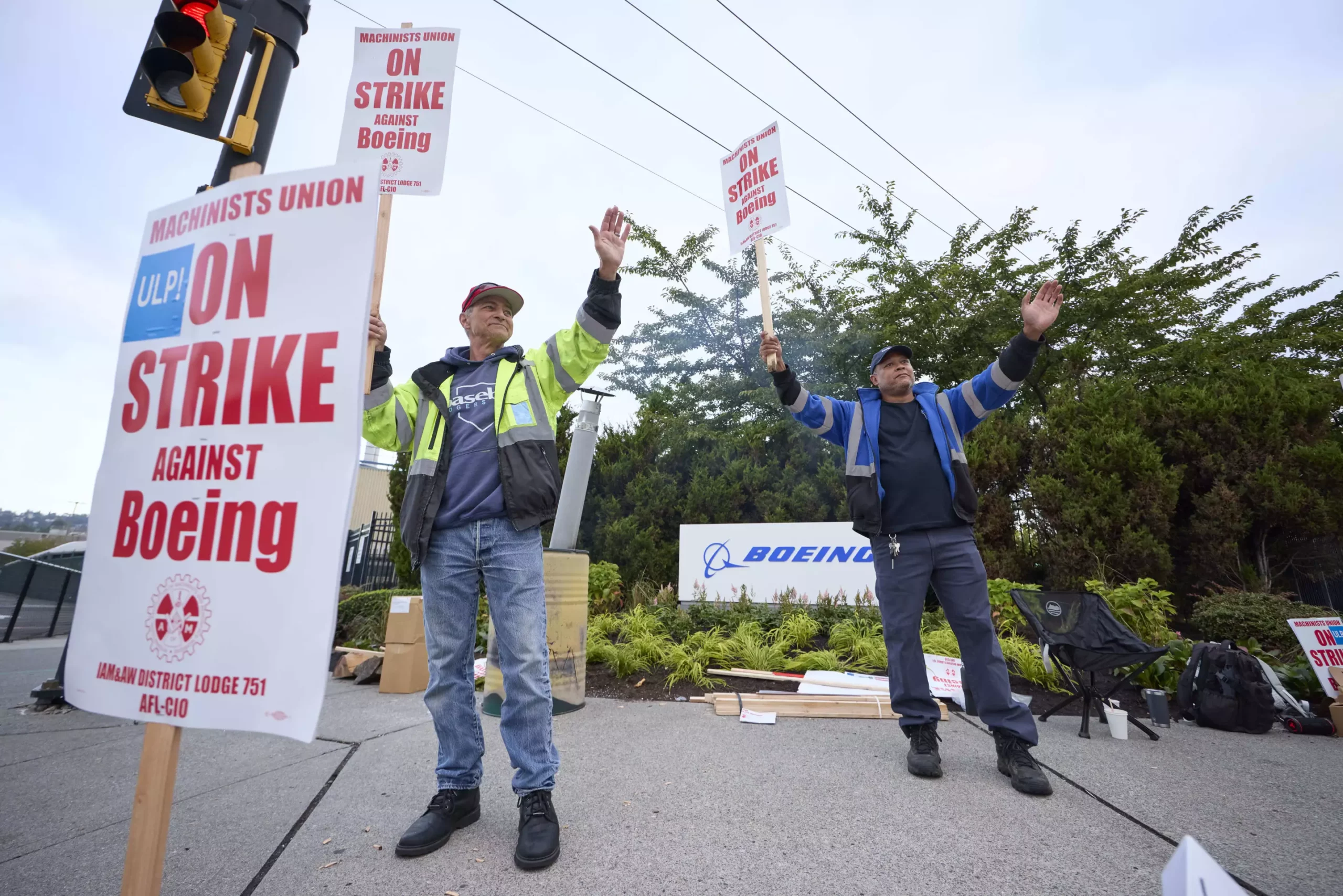The recent strike by blue-collar workers at Boeing has thrown the company, already grappling with financial woes and reputational issues, into a deeper crisis. The machinations behind the decision to strike reflect not just the demands of 33,000 machinists but also resonate with a broader narrative about worker rights and corporate responsibility. As the machinists took to picket lines in the Pacific Northwest, their actions highlighted an increasingly strained relationship between labor and management, as well as the growing challenges facing a giant in aerospace manufacturing.
After a remarkable 94.6% of the members of the International Association of Machinists and Aerospace Workers voted against a proposed contract, Boeing’s production faced an abrupt halt. The rejected contract offered workers a wage increase of 25% spread over four years—a figure that many argued failed to reflect the reality of rising everyday costs in a region notorious for its high cost of living. The company faced immediate backlash; Boeing stock experienced a significant drop, shedding over 3% of its value in a single trading session, which only added to its nearly 40% decline over the year.
The strike has implications not only for the machinists’ financial expectations but also for Boeing’s overall operations. While airline flights are not expected to be directly delayed, production of key models such as the 737 Max, alongside the 777 and 767, may face disruptions—the ramifications of which can be extensive, especially considering that airlines typically pay a significant portion of the purchase price upon delivery.
Voices from the picket lines told a compelling story of frustration and desperation. Workers like John Olson illuminated the harsh realities of stagnant wages, pointing out how a mere 2% pay rise over six years starkly contrasts with the soaring inflation that has gripped the region. Such sentiments are far from isolated; they paint a picture of an entire workforce grappling with a sense of being undervalued and overlooked by a company whose profits seemed to bounce back faster than their workers’ wages.
The company’s promises—including a commitment to build new aircraft in Washington—were overshadowed by fears of inadequate compensation and diminishing benefits. The union’s calls for the restoration of traditional pensions—eliminated a decade ago—emphasized a longing for stability and recognition that many workers felt had been stripped away in the name of corporate efficiency.
In the wake of the strike announcement, Boeing expressed disappointment, yet their words seemed to lack the weight of genuine concern as they acknowledged the rejected deal. The company’s Chief Financial Officer noted the challenges ahead, emphasizing a need for cash conservation in light of the halt in manufacturing. With a staggering $60 billion in total debt, the financial stakes are higher than ever, and the unresolved strike only adds to the unfolding narrative of Boeing’s ongoing struggles.
It’s not merely a matter of numbers; the company’s ability to build trust with its workforce is now under scrutiny. The newly appointed CEO Kelly Ortberg faces an uphill battle. While he has expressed a desire for cooperation and understanding, the actions of the union indicate a disconnect between management’s perceptions and the realities faced by workers. As Ortberg conceded, “no one wins” in a strike—a clear acknowledgment of the fragile state of affairs each side must navigate.
This protest goes beyond Boeing; it is indicative of a growing tide of labor actions across the nation. Workers in various sectors are increasingly willing to voice their dissatisfaction—drawing lines in the sand over issues of respect, compensation, and a future that adequately reflects their contributions. As the nation’s workforce evolves, a reckoning is simmering where labor rights and corporate responsibilities are paramount.
Labor disputes like Boeing’s remind us that no company is immune from the collective sentiment of its workforce, especially during tough economic times, heightened by the lingering aftereffects of the pandemic. The call for a more equitable distribution of wealth brewing in the factories may well demand the CEO’s immediate and undivided attention, urging a structural reevaluation of how corporate profits align with employee treatment.
Ultimately, the strike at Boeing serves as a critical juncture that could determine the future dynamics between labor and management. The expectations for fair compensation, decent working conditions, and a semblance of respect from corporate leadership are not merely demands—they are rights workers are willing to fight for. For Boeing, navigating this turbulent period will require a delicate balance between operational recovery and addressing the grievances of its employees. Failure on either front risks deepening the wounds of mistrust and financial struggle, challenging an already beleaguered aerospace titan to rethink not just its contracts, but its entire relationship with those who build its products.


Leave a Reply